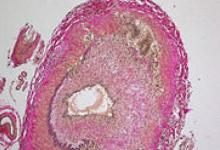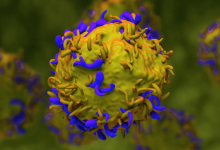Best of 2022: The Contribution of the Gut Microbiome and Diet to Joint Inflammation in PsA Save

Editor's note: this blog originally appeared April 29, 2022, and is being shared again as a Best of 2022. Enjoy!
Interactions of the gut microbiota in humans promote the release of a variety of metabolites with profound effects on human health and immune regulation. These metabolites and compounds derived from the microbiota exert inflammatory and anti-inflammatory effects in the intestinal tissues and systemically.
Microbial species are essential for maintenance of immunological hemostasis at multiple levels. First, the HLA repertoire shapes the microbial populations in the intestine, a finding demonstrated in both animal models and HLAB27 positive patients with axial spondylitis. Second, leaky gut, resulting from damage to the epithelial cells lining the intestine, permits entry of bacteria and pro-inflammatory metabolites along with other products into the intestinal lumen and into the blood stream triggering local and systemic inflammation. Third, entry of bacteria and related metabolites into the lumen, in the setting of leaky gut, results in activation of intestinal T cells that migrate to several sites including the brain, joints and entheses. Recent studies also support a model in which skin dysbiosis may provide a microenvironment conducive to the formation of psoriatic plaques.
Recent data point to leaky gut is a precursor of inflammatory arthritis in animal models and humans. This link should not be a surprising given the established relationship between intestinal infections and reactive arthritis, the presence of asymptomatic colonic inflammation in patients with spondyloarthritis and the absence of arthritis in the HLA-27 rat model of spondyloarthritis when these animals are raised in a germ-free environment. Moreover that leaky gut is associated with the onset of joint inflammation in murine arthritis models and RA patients also demonstrate altered intestinal barrier function prior to arthritis onset. Inhibition of leaky gut with the short chain fatty acid, butyrate, inhibits the transition to arthritis in a well-established mouse model.
In regards to PsA, Scher et al reported that PsA demonstrates less fecal microbial species diversity and lower levels of medium chain fatty acids than controls. Of related interest is that a sub-group of PsA patients treated with secukinumab demonstrated shifts in bacterial and fungal taxa, particularly Clostridiales and Candida albicans, which may be related to gut dysbiosis observed in a minority of patients treated with IL-17 blockade. Although we have not directly linked altered microbiota to the development or persistence of psoriatic arthritis, these tantalizing findings to date support the presence of a gut-joint axis. We anticipate rapid progress in this area with the development of metagenomics, single cell RNAseq and spatial transcriptomics performed in large well-phenotyped arthritis cohorts coupled with an existing rich database of resident microbial gut species and metabolites in control populations (Human Microbiome Consortium).
The composition of our dietary intake is a major factor modulating the structure of the microbiome.
Modern diets are rich in carbohydrates, salt and saturated fatty acids and deficient in fiber, vitamins and minerals. The western diet is associated with unprecedented rates of obesity in the U.S. along with a spike in chronic inflammatory diseases. Interestingly, a shift to a Th17 profile is linked to obesity along with changes in the intestinal microbiome. The fact that obesity is a major risk factor for psoriasis and PsA and that these patients suffer from higher rates of metabolic syndrome, type 2 diabetes and cardiovascular disease has prompted efforts to understand if weight loss or efforts to alter the microbiome can lessen inflammation in these disorders. This strategy is bolstered by the fact that negative energy balance, achieved by expending more energy than consumed, drives integrated immunometabolic responses that promote longevity and counter-balance inflammatory pathways.
Dietary studies are extremely challenging to perform due to limitations arising from small sample size, short timeframes, blinding, confounding therapies and high dropout rates. Nevertheless, several studies in RA over the past 30 years demonstrated that hypocaloric and anti-inflammatory diets can lessen inflammation.
In a recent presentation at the AAAAI Meeting, Dr. Guma from UCSD, showed that RA patients treated for 2 weeks with an anti-inflammatory diet demonstrated significantly improved clinical outcomes (DAS28, pain, fatigue) without significant weight loss compared to the control group. Moreover, responders had a significant change in the microbiome in terms of composition and diversity. These dramatic changes over a 2 week period demonstrate the powerful effects of dietary intervention on chronic inflammation. In PsA, Klingberg et al. placed patients on an aggressive hypocaloric diet for 14 weeks that resulted in dramatic weight loss and these patients showed significant improvements in multiple clinical features and inflammatory parameters of arthritis that were maintained on follow-up a year later with almost no dropout in this cohort when maintained on a more liberal hypocaloric regimen.
Other case series find that bariatric surgery in psoriasis patients is associated with marked improvements in psoriasis. One can envision a therapeutic approach that combines anti-inflammatory therapies with a hypocaloric and anti-inflammatory diet in PsA to improve outcomes. Drs. Lihi Eder and Alexis Ogdie are currently engaged in a study to examine the effects of a Mediterranean diet on inflammation in a cohort of PsA patients.
We are entering a new era in which improved understanding of the impact of the types of food we eat can greatly improve our health, increase longevity and serve as a potent therapy to lessen inflammation in immune-mediated disorders.










If you are a health practitioner, you may Login/Register to comment.
Due to the nature of these comment forums, only health practitioners are allowed to comment at this time.